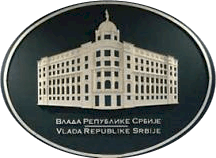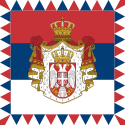Aleksandar Vučić
| Aleksandar Vučić | |
|---|---|
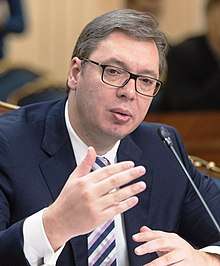 | |
| 5th President of Serbia | |
|
Assumed office 31 May 2017 | |
| Prime Minister |
Ivica Dačić (Acting) Ana Brnabić |
| Preceded by | Tomislav Nikolić |
| 11th Prime Minister of Serbia | |
|
In office 27 April 2014 – 31 May 2017 | |
| President | Tomislav Nikolić |
| Deputy |
Ivica Dačić (First) Rasim Ljajić Zorana Mihajlović Kori Udovički Nebojša Stefanović |
| Preceded by | Ivica Dačić |
| Succeeded by |
Ivica Dačić (Acting) Ana Brnabić |
| First Deputy Prime Minister of Serbia | |
|
In office 27 July 2012 – 27 April 2014 | |
| Prime Minister | Ivica Dačić |
| Preceded by | Ivica Dačić |
| Succeeded by | Ivica Dačić |
| Minister of Defence | |
|
In office 27 July 2012 – 2 September 2013 | |
| Prime Minister | Ivica Dačić |
| Preceded by | Dragan Šutanovac |
| Succeeded by | Nebojša Rodić |
| Minister of Information | |
|
In office 24 March 1998 – 24 October 2000 | |
| Prime Minister | Mirko Marjanović |
| Preceded by | Radmila Milentijević |
| Succeeded by |
Ivica Dačić Biserka Matić-Spasojević Bogoljub Pejčić |
| Personal details | |
| Born |
5 March 1970 Belgrade, Serbia, Yugoslavia |
| Nationality | Serbian |
| Political party |
Radical (1993–2008) Progressive (2008–present) |
| Spouse(s) |
Ksenija Janković (m. 1997; div. 2011) Tamara Đukanović (m. 2013) |
| Children | 3 |
| Alma mater | University of Belgrade |
| Signature |
 |
| Website |
vucic |
Aleksandar Vučić (Serbian Cyrillic: Александар Вучић, pronounced [aleksǎːndar ʋǔtʃitɕ], born 5 March 1970) is a Serbian politician who has been the President of Serbia since 31 May 2017. He is also the president of the Serbian Progressive Party (SNS).
Before his tenure as his country's president Vučić served as the Prime Minister of Serbia in two terms from 2014-2016 and from 2016 until 2017, as well as the Deputy Prime Minister since 2012 until 2014. Furthermore, Vučić served as a member of the Serbian parliament, Minister of Information from 1998 to 2000 and later as Minister of Defence from 2012 to 2013.
In April 2017, Vučić was elected President of Serbia with over 55% of the vote in the first round, thus avoiding a second round. He formally assumed office on 31 May 2017, succeeding Tomislav Nikolić. His ceremonial inauguration ceremony was held on 23 June 2017.
Early life and education
Aleksandar Vučić was born in Belgrade, to Anđelko and Angelina Vučić (née Milovanov). His paternal ancestors hailed from Čipuljić, near Bugojno, in central Bosnia. They were expelled by the Croatian fascist Ustaše during World War II and settled near Belgrade, where his father was born.[1] Vučić's paternal grandfather Anđelko, and tens of other close relatives were killed by the Ustaše.[2]
His mother was born in Bečej in Vojvodina.[1] Both of his parents were economics graduates. His father worked as an economist, his mother as a journalist.[1]
Vučić was brought up in New Belgrade,[1] and finished the Branko Radičević elementary school, and later a gymnasium in Zemun. He graduated from the University of Belgrade Faculty of Law. He learned English in Brighton, England, and worked as a merchant in London for some time. After returning to Yugoslavia, he worked as a journalist in Pale, Bosnia and Herzegovina. There, he interviewed politician Radovan Karadžić and once played chess with general Ratko Mladić.[3] As a youngster, Vučić was a fan of the Red Star football club, often attending Red Star's matches,[3] including the one played between Dinamo Zagreb and Red Star on 13 May 1990, which turned into a huge riot.[4] The homes of his relatives were destroyed in the Croatian War of Independence.[2]
Political career
Vučić joined the Serbian Radical Party (SRS) in 1993, far right party whose core ideology is based on Serbian nationalism and the goal of creating a Greater Serbia.,[5][6] and was elected to the National Assembly following the 1993 parliamentary election. Two years later, at age 24, Vučić became secretary-general of the SRS. After his party won the local elections in Zemun in 1996, he became the director of Pinki Hall.[7] Which was his first employment.
Minister of Information (1998–2000)
In March 1998, Vučić was appointed Minister of Information in the government of Mirko Marjanović.[8] Following rising resentment against Milošević, Vučić introduced fines for journalists who criticized the government and banned foreign TV networks.[9] He recalled in 2014 that he was wrong and had changed, stating "I was not ashamed to confess all my political mistakes".
During this period, Serbian media was accused for broadcasting Serbian nationalist propaganda, which demonised ethnic minorities and legitimised Serb atrocities against them.[10] On 23 April 1999, during Kosovo War, NATO bombed the RTS headquarters in downtown Belgrade, killing 16 people.[11] NATO Headquarters justified the bombing with two arguments; firstly, that it was necessary "to disrupt and degrade the command, control and communications network" of the Yugoslav Armed Forces, and secondly, that the RTS headquarters was a dual-use object which "was making an important contribution to the propaganda war which orchestrated the campaign against the population of Kosovo".[12]
Radical Party to Progressive Party
Tomislav Nikolić, deputy leader of the Radical Party and de facto interim leader due to absence of Vojislav Šešelj, resigned on 6 September 2008 because of disagreement with Šešelj over the party's support for Serbia's EU membership. With some other well-known Radical Party he members formed a new parliamentary club called "Napred Srbijo!" (Forward Serbia!). On 12 September 2008 Nikolić and his group were officially ejected from the Radical Party on the session of SRS leadership. Vučić, as secretary-general was called to attend this session, but he did not appear. Tomislav Nikolić announced he would form his own party and called Vučić to join. Vučić, one of the most popular figures among SRS supporters, resigned from Radical Party on 14 September 2008.[13] The next day, Vučić announced his temporary withdrawal from politics.[14]
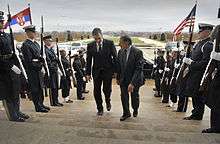
On 6 October 2008 Vučić confirmed in a TV interview that he was to join the newly formed Nikolić's Serbian Progressive Party (SNS) and that he would be the Deputy President of the party. He then seemed to change his positions. In 2010 he made statements such as a "horrible crime was committed in Srebrenica", saying he felt "ashamed" of the Serbs who did it. "I do not hide that I have changed... I am proud of that," he told AFP in an interview in 2012. "I was wrong, I thought I was doing the best for my country, but I saw the results and we failed, We need to admit that."[15]
Nikolić stepped down as party leader on 24 May 2012 following his election as President of Serbia. Vučić assumed leadership until the next party congress is held to elect a new leader. On 29 September 2012 Vučić was elected as party leader, with Jorgovanka Tabaković as his deputy.
Minister of Defence and First Deputy Prime Minister (2012–2014)
Vučić briefly served as Minister of Defence and First Deputy Prime Minister from July 2012 to August 2013, when he stepped down from his position of Defence Minister in a cabinet reshuffle. Although the Prime Minister, Ivica Dačić Deba, held formal power as head-of-government, many analysts thought that Vučić had the most influence in government as head of the largest party in the governing coalition and parliament.[9]
Prime Minister (2014–2017)
.jpg)
2014 parliamentary election
As a result of the 2014 parliamentary election, Vučić's Serbian Progressive Party won 158 out of 250 seats in Parliament and formed a ruling coalition with the Socialist Party of Serbia. Vučić was elected Prime Minister of Serbia.
2016 parliamentary election
At a party conference of his ruling Serbian Progressive Party, Vučić announced early general elections, citing that: 'He wants to ensure that the country has stable rule that its current political direction will continue – including its attempt to secure membership of the EU.'[16] On March 4, 2016, Serbian President, Tomislav Nikolić, dissolved the parliament, scheduling early elections for April 24.[17] The ruling coalition around Vučić's SNS obtained 48.25% of the vote.[18][19] Vučić's ruling SNS retained majority in the parliament, despite winning less seats than in 2014 parliamentary election. The coalition around SNS won 131 seats, 98 of which belong to SNS.[20]
2017 presidential election
Vučić announced his candidacy in the presidential election on February 14, 2017, despite earlier statements that he would not run.[21]
After initial speculations that the incumbent President, Tomislav Nikolić, would also run, he backed Vučić and his ruling SNS party. Vučić won the election in the first round, having obtained 56,01 percent of the vote. The independent candidate, Saša Janković was second with 16,63 percent, ahead of satirical politician Luka Maksimović and former Minister of Foreign Affairs Vuk Jeremić.[22]
President (2017–present)
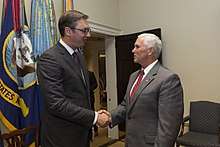
The election result sparked protests around Serbia. Thousands of protesters accused Vučić of leading the country towards authoritarianism. Protesters organised the rallies through social networks and insist they are not linked to any party or politician, and demand a total overhaul of what they call "corrupt political, business and media systems that serve an elite led by Mr Vučić".[23] Vučić maintained that the protests were organized by his political opponents who expected “the dictator would bring the police into the streets.”[24]
.jpg)
However, Vučić was sworn in as President of Serbia on 31 May, in front of Parliament.[25] He promised to continue with reforms and said Serbia will remain on European path. He also said Serbia will maintain military neutrality, but continue to build partnership with both NATO and Russia.[26]
After becoming President, Vučić disbanded the traditional police security service responsible for President's protection, and replaced it with members of the Cobras, military police unit which contrary to the law, protected him while he served as the Prime Minister from 2014 to 2017.[27]
On 3 September 2017, a Bentley luxury vehicle with three men inside of it, crashed into the presidential motorcade.[28] President Vučić and his staff were unharmed and the men were arrested on suspicion of jeopardizing the president's security.[28][29] Media close to Vučić reported it as yet another assassination attempt, while the opposition leaders claim that it is a "propaganda to portray the former ultra-nationalist as a victim and to turn attention away from Serbia's economic and social problems".[28][29]
In September 2018 in a speech to Kosovo Serbs he stated: "Milošević was a great Serbian leader, he had the best intentions, but our results were far worse."[30] Serbia and Kosovo have been attempting to negotiate a possible border partition, although the proposal remains extremely controversial. Kosovo Prime Minister Ramush Haradinaj exclaimed that any change of the Kosovo border with Serbia would lead to war.[31] John R. Bolton, national security advisor to the U.S. president, said that "the US policy is that if the two parties can work it out between themselves and reach agreement, we don’t exclude territorial adjustments. We would not stand in the way, and I don’t think anybody in Europe would stand in the way if the two parties to the dispute reached a mutually satisfactory settlement."[32]
Policies
Anti-corruption and organized crime
Vučić has pledged to tackle corruption and organized crime in Serbia.[33] He also vowed to investigate controversial privatizations and ties between tycoons and former government members.[9][34] Vučić’s anti-corruption drive has recorded a 71 per cent personal approval rating in a March 2013 opinion poll,[33] though in more than two years it produced no convictions and only a handful of arrests.
Economy
After his election as Prime Minister in 2014, Vučić promoted austerity based economic policies, whose aim was to reduce Serbia's budget deficit. Vučić's policy of fiscal consolidation was primarily aimed at cuts in the public sector. One of the measures was the reduction of pensions and salaries in the public sector, as well as a ban on further employment in the public sector.[35] Vučić announced that his reform based policies have reduced country's deficit, and contributed to financial stability. However, criticism of Vučić's economic policy stated that his measures have not overall contributed to economic recovery, but have instead caused a further decline in living standard. On February 23, 2015, Vučić's government has concluded a three-year stand-by arrangement with the IMF worth €1.2 billion, as a precautionary measure to secure the country's long term fiscal stability.[36] The IMF has praised the reforms as has the EU[37][38] calling them one of the most successful programmes the IMF has ever had. The GDP of Serbia has surpassed the pre crisis of 2008 levels as have the salaries.[39] The economic prospects are good with GDP growth rising above 3% and the debt to GDP ratio falling below 68%[40][37]
EU and Immigration policy
During the 2015 - 2016 European migrant crisis, Vučić strongly aligned himself with the policies of the German Chancellor, Angela Merkel, and publicly praised German migration policy. Vučić also stated that Serbia will cooperate with the EU in solving the migrant stream going from the Middle East to EU member countries through the Balkan route, and that Serbia will be ready to take some portion of the migrants. "Serbia will receive a certain number of migrants. This makes us more European than some member states. We don't build fences," Vučić wrote on Twitter, while criticizing the migrant policies of some EU member countries.[41]
EU membership and Kosovo
Vučić has been central to negotiations on Serbia’s bid for EU accession, traveling to Brussels for talks with the EU’s Foreign Affairs High Commissioner, Baroness Ashton, as well as to North Kosovska Mitrovica to discuss the details of a political settlement between Belgrade and Pristina.[42][43] During his visit to northern Kosovo, to garner support for the Brussels-brokered deal, he urged Kosovo Serbs to “leave the past and think about the future”.[34]
In 2017, Vučić accused EU of hypocrisy and double standards over its very different attitude to separatist crises in Kosovo and Catalonia.[44]
Relations with Croatia
In 2007 Vučić made inflammatory remarks about the Democratic League of Croats in Vojvodina, calling it a branch of the Croatian Democratic Union.[45] In 2008, with the establishment of the Serbian Progressive Party, Vučić said that the goal of a Greater Serbia taking Croatian territory up to the proposed Virovitica-Karlovac-Karlobag line "is unrealistic and silly".[46] In December 2008 Vučić announced that he would make a visit to Croatian Serbs, causing a controversy. The Croatian newspaper Jutarnji list claimed in a reportage that none of his family members had been killed during World War II, upon which he replied that these were "brutal lies and attacks on his family".[2]
During 2015 and 2016, relations between Croatia and Serbia were further affected by to the ongoing migrant crisis, when Croatia decided to close its border with Serbia. In September 2015, Croatia barred all cargo traffic from Serbia,[47] due to the migrant influx coming from Serbia in a move which further eroded the fragile relations between the two countries. In response to these actions, Vučić announced that counter measures will be enacted if an agreement with Croatia is not reached.[48] The dispute was eventually resolved through the mediation of the EU Commission, yet the relations between the two neighboring countries remain fragile. On March 31, 2016, Vojislav Seselj, leader of the Serbian Radical Party, was acquitted of War Crime charges in the Hague Tribunal for Former Yugoslavia. The verdict has caused controversy in Croatia. Vučić distanced himself from Šešelj and his policy, but stated that the verdict should not be used as a tool for political pressure on Serbia.
On April 7, 2016 Croatia refused to endorse the EU Commission opinion to open Chapter 23, a part of Serbia’s EU accession negotiations, thus effectively blocking Serbia’ EU integration process. Serbia accused Croatia of obstructing its EU membership, and Vučić said that his government was: "Stunned by Croatia's decision not to support Serbia's European path."[49] Croatia has not agreed for Serbia to open negotiations of Chapter 23. On April 14, 2016, the EU Commission rejected Croatian arguments in its dispute with Serbia.[50] However, on July 7, 2016, Croatian Foreign Minister Miro Kovač announced that five conditions set by Croatia have been incorporated in the common position of the EU member states for negotiations with Serbia which will be the basis on which Serbia's progress in Chapter 23, concerning the judiciary and fundamental rights, will be assessed. These five conditions are: Serbia has to: 1. steer clear of conflicts of jurisdiction concerning war crimes, 2. cooperate with neighboring countries in search and identification of missing persons or their remains, 3. strengthen its investigative, prosecution, and judicial authorities, 4. strengthen protection of (Croatian) minority, and 5. fully cooperate with the ICTY.[51]
Relations with Russia
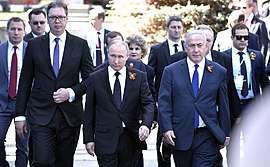
Vučić has maintained traditional good relations between Serbia and Russia, and his government refused to enact sanctions on Russia, following the crisis in Ukraine and the Annexation of Crimea. Vučić has repeatedly announced that Serbia will remain committed to its European integration, but also maintain historic relations with Russia. "We have proven our sincere and friendly attitude to Russia by being one of the European countries that refused to impose sanctions on Russia," Vučić said after meeting with Russian Prime Minister Dmitry Medvedev. "Serbia will continue pursuing this policy in the future.[52]
During Vučić’s mandate, Serbia has continued to expand its economic ties with Russia, especially by increasing Serbian exports to Russia. In early 2016, after a meeting with the Russian Deputy Prime Minister Dmitry Rogozin, Vučić announced the possibility of Serbia boosting its military cooperation with Russia by purchasing Russian missile systems.[53]
In December 2017, Vučić made an official visit to the Russian Federation for the first time as the President of Serbia.[54] He expressed his gratefulness to Russia for protecting Serbian national interests, and stated that: "Serbia will never impose sanctions on the Russian Federation (in relation to the international sanctions during the Ukrainian crisis)".[54] During his visit, he focused on strengthening cooperation in the field of military industry and energy.[54]
Controversies
Greater Serbia
Until 2008, Vučić was a disciple of the Greater Serbia ideology, which he testified was envisaged as extending to a western border running along the Virovitica–Karlovac–Karlobag line.[55][56][57] In 1995, during the Croatian War of Independence, Vučić said in Glina (which was at the time controlled by the rebelled Serbs) that 'Serbian Krajina' and Glina would never be Croatian, Banovina would never be returned to Croatia, and that if Serbian Radical Party had won elections, Serbs would have lived in Greater Serbia.[58][59] In another speech from early 2000's, Vučić called Karlobag, Ogulin, Karlovac and Virovitica "Serbian towns", stated that "they [SRS's crtics] rejoice that Ustaše (referring to Croats) have occupied Serbian lands and want to convince us Serbian radicals that it wasn't Serbian, that we were saying nonsenses. (...) We want what's ours, Serbian."[59] After split from the Serbian Radical Party and creation of the Serbian Progressive Party, Vučić said he no longer supports the Greater Serbia ideology.[60]
Srebrenica massacre
On 20 July 1995, during the Bosnian War, Vučić said in National Assembly: “for every Serb killed, we will kill 100 Muslims” only a few days after the Srebrenica massacre, when more than 8000 Muslim Bosniaks were killed by the Army of Republika Srpska and paramilitary groups from Serbia.[61][62][63] In 2015, he said that his statement from 1995 was "taken out of context" and "that was not the essence of that sentence."[64]
Invited by the Bosnian government to attend the annual Srebrenica Genocide Memorial, Vučić accepted, travelling to Srebrenica on 11 July 2015 to pay his respects. He was attacked by a mob in the crowd with stones, bottles and other objects and had to flee the area. Members of the crowd shouted "Allāhu Akbar" and "Die, Chetnik".[65]
Ratko Mladić
Before splitting away from the Radical Party of Vojislav Šešelj, Aleksandar Vučić was openly and publicly celebrating and calling for the protection of Ratko Mladić, a military leader convicted of committing war crimes, crimes against humanity and genocide. In 2007, while Mladić was still at large in Serbia, Vučić was distributing posters stating "Safe house for general Mladić". During a parliament session he stated that the Serbian Parliament will always protect and be a safe house for the general and that any house in Serbia that bears the last name of Vučić will protect and shelter Mladić.[66]
In the same year Vučić organized a street protest where the signs naming the street after the assassinated pro-west Serbian PM were replaced with the signs effectively renaming the street to Ratko Mladić Boulevard.[66] This has become a frequent occurrence in which Serbian ultra-right factions vandalize same signs on top of the regular signs to celebrate the anniversary of the Zoran Đinđić assassination.[67]
Slavko Ćuruvija
It was during Vučić's term as the Minister of Information that Slavko Ćuruvija, a prominent journalist, was murdered in a state-sponsored assassination.[68][69] In 1999, before the assassination took place, Vučić gave a front page interview to the tabloid Argument in which he stated "I will have my revenge on Slavko Ćuruvija for all the lies published in Dnevni telegraf (Ćuruvija's paper).[70] In 2014, Vučić apologized to the Ćuruvija family for having waited so long to bring the perpetrators to justice, and thanked everyone who was involved in solving the case for their work.[71] Branka Prpa, Ćuruvija's common-law spouse, said Vučić participated in the murder and that he is the creator of the practice of persecution of journalists.[72]
Accusations of media manipulation and censorship
Multiple news outlets have accused Vučić of anti-democratic strongman tendencies.[73][74][75][76][77] In July 2014, journalists associations were concerned about the freedom of the media in Serbia, in which Vučić came under criticism.[78][79] The German newspaper Die Tageszeitung reported that the media in Serbia are censored and Vučić is responsible for that. Serbian journalist Jovana Gligorijević also expressed her concerns and said that, the freedom of speech was indeed threatened because internet pages were blocked, blogs removed and bloggers arrested" for which Gligorijević indirectly blamed Vučić.[78][79]
The situation was exacerbated when the commissioner for media freedom of the OSCE, Dunja Mijatović, wrote Vučić and made attention with the suppression of the media. Vučić said that the international community, foreign ambassadors and the OSCE would lead a campaign against him, because Serbia does not want to impose sanctions against Russia because of the Ukraine crisis, and that the suppression of the media are nonsense. He also claimed that he had never heard of these portals, which were blocked and demanded an apology from the OSCE. Paula Tide, the Vice President of the OSCE in Serbia, rejected the apology. The head of the European Union Delegation to the Republic of Serbia in Belgrade, Ambassador Michael Davenport, and the US Ambassador Michael Kirby shared Tide's opinion.[78][79]
In 2014 he was mocked for his "heroic" action in front of the state owned media portraying him of saving a boy from a snowstorm in a village named Feketić.[80][81]
Personal life
On 27 July 1997, Vučić married Ksenija Janković, a journalist at Radio Index and Srpska reč. The couple has two children. The marriage ended with divorce in 2011.
On 14 December 2013, Vučić married Tamara Đukanović, a diplomat with the Ministry of Foreign Affairs of Serbia.[82] On 9 June 2017, a week after Vučić took the presidential office, his wife gave birth to a son.[83]
Honours
Honorary doctorates
| Date | University | Note |
|---|---|---|
| 2017 | Moscow State Institute of International Relations | [84] |
| 2018 | Azerbaijan University of Languages | [85] |
Orders
| Award or decoration | Country | Date | Place | |
|---|---|---|---|---|
| Order of Friendship[86] | 9 October 2018 | Astana | ||
References
- 1 2 3 4 Poreklo.
- 1 2 3 "Aleksandar Vučić: Hrvati se rugaju mojim ubijenim precima!". Novosti.
- 1 2 Isailović & 6 September 2010.
- ↑ Index.hr & 13 May 2015.
- ↑ Mardell, Mark (26 January 2007). "Europe diary: Serbian Radicals". BBC News. Retrieved 23 May 2010.
- ↑ "Seselj, Greater Serbia and Hoolbroke's shoes". SENSE Tribunal. 19 August 2005. Retrieved 25 April 2011.
- ↑ Aleksandar Vučić Archived 3 November 2014 at the Wayback Machine. Istinomer.rs
- ↑ "Narod koji ima najkraće pamćenje na svetu" (in Serbian). Preko ramena. 10 May 2012.
- 1 2 3 Guy De Launey (20 January 2014). "Serbia transforming from pariah to EU partner". BBC News. Retrieved 22 January 2014.
- ↑ Judah. The Serbs. Yale University Press. ISBN 978-0-300-15826-7.
- ↑ "Payoffs, fear and bloody conflict". 10 February 2000.
- ↑ McCormack 2006, p. 381.
- ↑ "Nikolić: I Vučić napustio radikale" (in Serbian). Mondo. 14 September 2008. Archived from the original on 15 September 2008.
- ↑ "Vučić napušta politiku (za sada)" (in Serbian). Mondo. 15 September 2008. Archived from the original on 16 September 2008.
- ↑ Aleksandar Vucic: from nationalist hawk to devout Europeanist Archived 22 March 2014 at the Wayback Machine., GlobalPost.com, 13 March 2014.
- ↑ "Serbia PM Announces Early General Elections :: Balkan Insight". Retrieved 11 September 2016.
- ↑ "ODLUČENO Nikolić raspisao vanredne izbore za 24. april". 4 March 2016. Retrieved 11 September 2016.
- ↑ "Конференције за медије". Retrieved 11 September 2016.
- ↑ "RIK objavio konačne rezultate izbora, u Skupštini predstavnici 12 lista". Retrieved 11 September 2016.
- ↑ "Narodna skupština Republike Srbije - Poslaničke grupe". Retrieved 11 September 2016.
- ↑ Председништво СНС-а: Вучић кандидат за председника (Serbian) RTS February 14, 2017, retrieved April 28, 2017
- ↑ Vucic Wins Serbian Presidential Elections Balkan Insight April 2, 2017, retrieved April 28, 2017
- ↑ McLaughlin, Daniel. "Young Serbs vow to stop 'dictatorship' of president-elect Vucic". The Irish Times. Retrieved 21 January 2018.
- ↑ Bogović, Nataša. "PM Vucic: Opposition thought that the "dictator" will bring the police into the streets". Insajder. Retrieved 21 January 2018.
- ↑ ALEKSANDAR VUCIC SWORN IN AS SERBIAN PRESIDENT Euronews May 31, 2017
- ↑ Vucic sworn in as Serbia's new president amid protests ABC News, May 31, 2017
- ↑ "Vučić nema poverenja u policiju". danas.rs (in Serbian). Danas. 2 September 2017. Retrieved 3 September 2017.
- 1 2 3 Wilford, Greg (3 September 2017). "Three arrested after Bentley crashes into Serbian president's motorcade, newspaper says". independent.co.uk. The Independent. Retrieved 3 September 2017.
- 1 2 "Bentlijem naleteli na vozilo s Vučićem, uhapšeni". b92.net (in Serbian). Tanjug. 3 September 2017. Retrieved 3 September 2017.
- ↑ "Vučić u Mitrovici: Milošević je bio veliki srpski lider". Al Jazeera Balkans (in Bosnian). 2018-09-09. Retrieved 2018-09-10.
- ↑ McLaughlin, Daniel (August 29, 2018). "Kosovo premier warns border change with Serbia 'would mean war'". The Irish Times. Retrieved 2018-09-18.
- ↑ Rudic, Filip (August 24, 2018). "US Won't Oppose Serbia-Kosovo Border Changes – Bolton". Balkan Insight. Retrieved 2018-09-18.
- 1 2 Vasovic, Aleksandar (29 March 2013). "Ruling Serb Progressive Party stays popular: opinion poll". Reuters. Retrieved 18 September 2013.
- 1 2 Pekusic, Biljana (20 May 2013). "Vucic urges Kosovo Serbs to accept 'the future'". Southeast European Times. Retrieved 18 September 2013.
- ↑ "PM: Salaries, pensions, subsidies to be cut - - on B92.net". Retrieved 11 September 2016.
- ↑ "Press Release: IMF Executive Board Approves €1.2 billion Stand-By Arrangement for Serbia". Retrieved 11 September 2016.
- 1 2 "EU "praises Serbia's economic growth, outlines challenges" - - on B92.net". B92.net. Retrieved 2017-07-27.
- ↑ "Serbia: Concluding Statement of the Mission for the 2017 Article IV Consultation and the Seventh Review under the Stand-By Arrangement (SBA)". www.imf.org. Retrieved 2017-07-27.
- ↑ "Average monthly salary in Serbia "first time" over EUR 400 - - on B92.net". B92.net. Retrieved 2017-07-27.
- ↑ "Serbia's central govt debt narrows to 67.1%/GDP at end-May - table - SeeNews - Business intelligence for Southeast Europe". seenews.com. Retrieved 2017-07-27.
- ↑ "Serbia Will Take in Some Migrants, Vucic Says :: Balkan Insight". Retrieved 11 September 2016.
- ↑ Sengupta, Kim (4 August 2013). "Aleksandar Vucic: The man who's bringing Belgrade in from the cold". The Independent. Retrieved 18 September 2013.
- ↑ "Aleksandar Vucic: Kosovo Serbs 'should accept deal'". BBC News. 13 May 2013. Retrieved 18 September 2013.
- ↑ "Russia and Serbia deride EU reaction to Catalan vote". The Irish Times. 3 October 2017.
- ↑ "Šešeljevac vodi Skupštinu, a Vuk Drašković Vijeće Europe". Retrieved 11 September 2016.
- ↑ Vučić sad nije za veliku Srbiju Archived 4 December 2008 at the Wayback Machine.
- ↑ "Road traffic halted between Serbia and Croatia in migrants row". 22 September 2015. Retrieved 11 September 2016 – via Reuters.
- ↑ "Serbia to wait for deal with Croatia until Sept. 24 - - on B92.net". Retrieved 11 September 2016.
- ↑ "Serbia accuses Croatia of obstructing its EU membership talks". 8 April 2016. Retrieved 11 September 2016 – via Reuters.
- ↑ "European Commission Rejects Croatia's Arguments in Its Dispute with Serbia". Retrieved 11 September 2016.
- ↑ "Otkrivamo pet uvjeta postavljenih pred Srbiju uoči otvaranja poglavlja 23!". Retrieved 11 September 2016.
- ↑ "Serbia's Vucic, Rejecting EU Sanctions On Russia, Visits With Putin". 29 October 2015. Retrieved 11 September 2016 – via Radio Free Europe / Radio Liberty.
- ↑ Kommersant (15 January 2016). "Serbia plans to buy air defense systems, MiG-29 fighters from Russia". Retrieved 11 September 2016.
- 1 2 3 "Vučić: Mi smo mali i ponosni, hvala Rusima na tri stvari". b92.net (in Serbian). 19 December 2017. Retrieved 26 December 2017.
- ↑ "Srebrenica memorial: Angry protest mars burial of massacred Muslims". Independent. 11 July 2015. Retrieved 15 February 2017.
- ↑ "Milosevic-era minister shakes off dark past on path to power in Serbia". Reuters. 13 March 2014. Retrieved 15 February 2017.
- ↑ "Aleksandar Vučić - Granice Velike Srbije će biti Karlobag, Ogulin, Karlovac i Virovitica!". Youtube.
- ↑ "Što je Vučić govorio u okupiranoj Glini 1995". tportal.hr. 19 March 2014. Retrieved 15 February 2017.
- 1 2 "VIDEO Pogledajte još jedan Vučićev govor: "Karlovac, Virovitica i Ogulin su srpske zemlje"".
- ↑ "Vučić: Velika Srbija nerealna". tportal.hr. 10 December 2008. Retrieved 15 February 2017.
- ↑ Blair, David (11 July 2015). "Serbian leader forced to flee as thousands remember dead of Srebrenica". The Daily Telegraph. Retrieved 9 February 2017.
- ↑ Fisk, Robert (2016). "Europe has a troublingly short memory over Serbia's Aleksander Vucic". The Independent. Retrieved 9 February 2017.
- ↑ "Aleksandar Vucic projected to win presidential election". www.aljazeera.com.
- ↑ "Izetbegovic "disappointed" with Vucic". B92. 5 November 2015. Retrieved 9 February 2017.
- ↑ "Vucic attacked, hit with stones in Srebrenica (video)". B92. 11 July 2015.
- 1 2 Press Online :: Politika :: Vučić lepio plakate sa natpisom Bulevar Ratka Mladića Archived 2 March 2014 at the Wayback Machine.
- ↑ "Street signs bearing Đinđić name vandalized". B92. July 6, 2007. Retrieved 2018-09-18.
- ↑ Slavko Ćuruvija
- ↑ "Slavko Curuvija - Journalists Killed - Committee to Protect Journalists". Retrieved 11 September 2016.
- ↑ Ексклузивно На Монитору: „Убица“ Славка Ћурувије Је „Проговорио“… , wordpress.com; accessed 9 December 2015.
- ↑ "Milorad Ulemek provided info about murder of Slavko Ćuruvija", InSerbiaNews.info; accessed 9 December 2015.
- ↑ Stanković, Stefan (2 June 2015). "Branka Prpa u Pressingu: Zašto Vučić nije pozvan da svedoči?". The Independent. Retrieved 9 February 2017.
- ↑ Filipovic, Gordana (March 27, 2017). "How a Premier May Become a Strongman in Serbia: QuickTake Q&A". Bloomberg. Retrieved 2018-09-18.
- ↑ Nougayrède, Natalie (2018-04-11). "Beware the chameleon strongmen of Europe". the Guardian. Retrieved 2018-09-18.
- ↑ Karnitschnig, Matthew (2016-04-14). "Serbia's latest would-be savior is a modernizer, a strongman — or both". Politico Europe. Retrieved 2018-09-18.
- ↑ Janjevic, Darko (June 18, 2017). "EU and the Balkans: Brussels' favorite strongmen". DW. Retrieved 2018-09-18.
- ↑ Anastasijevic, Dejan (April 4, 2017). "Serbia's Vucic stronger than ever". EU Observer. Retrieved 2018-09-18.
- 1 2 3 Die Tageszeitung:Die Pampigkeit des Herrn Vučić - In Serbien werden Internetseiten attackiert, Blogs gesperrt und Blogger festgenommen. Die Betroffenen berichteten wohl zu kritisch über die Regierung (German) - The stroppiness of Mr. Vučić - In Serbia being attacked websites, blocked blogs and arrested bloggers. The victims reported probably too critical about the government
- 1 2 3 Die Tageszeitung:"Serbische Regierung zensiert Medien - Ein Virus namens Zensur", taz.de; accessed 9 December 2015.(in German)
- ↑ "Online War Over Mocking Video of Serbian Deputy PM". Retrieved 2018-02-18.
- ↑ "VUČIĆ KOD FEKETIĆA: Spasavao decu iz smetova (VIDEO)". kurir.rs (in Serbian). Retrieved 2018-02-18.
- ↑ Bojović, B. (12 August 2014). "Šta je Dačić savetovao Vučićevoj supruzi". Blic. Retrieved 11 July 2015.
- ↑ "Vučić: Moraću da prekinem obaveze, dobili smo sina". b92.net (in Serbian). Retrieved 9 June 2017.
- ↑ "Serbian President Aleksandar Vučić Becomes MGIMO Honorary Doctor". mgimo.ru. 20 December 2017. Retrieved 25 December 2017.
- ↑ "Serbian President receives honorary doctorate from Azerbaijan University of Languages". azertag.az. 22 May 2018. Retrieved 27 May 2018.
- ↑ "Aleksandar Vučić - Order of Friendship from the President of Kazahstan". Večernje Novosti. Retrieved 2018-10-09.
Sources
- Isailović, Danijela (6 September 2010). "Ispao majci dok ga je dojila" (in Serbian). Index.hr. Retrieved 28 May 2015.
- "Najvažniji politički lideri regije porijeklom su iz BiH: Milanović, Bandić, Jeremić, Tadić, Vučić..." (in Croatian). Index.hr. 18 July 2013. Retrieved 28 May 2015.
- "Vučić se prisjetio dana kada se tukao s Boysima na Maksimiru: Bilo je to očekivano, osjećala se mržnja" (in Croatian). Index.hr. 13 May 2015. Retrieved 28 May 2015.
Other sources
- "Порекло Александра Вучића" (in Serbian). Poreklo. Retrieved 28 May 2015.
External links
| Wikimedia Commons has media related to Aleksandar Vučić. |
| Political offices | ||
|---|---|---|
| Preceded by Radmila Milentijević |
Minister of Information 1998–2000 |
Succeeded by Ivica Dačić Bogoljub Pejčić Biserka Matić Spasojević |
| Preceded by Dragan Šutanovac |
Minister of Defence 2012–2013 |
Succeeded by Nebojša Rodić |
| Preceded by Ivica Dačić |
First Deputy Prime Minister of Serbia 2012–2014 |
Succeeded by Ivica Dačić |
| Prime Minister of Serbia 2014–2017 |
Succeeded by Ivica Dačić Acting | |
| Preceded by Tomislav Nikolić |
President of Serbia 2017–present |
Incumbent |
| Party political offices | ||
| Preceded by Tomislav Nikolić |
Leader of the Serbian Progressive Party 2012–present |
Incumbent |
